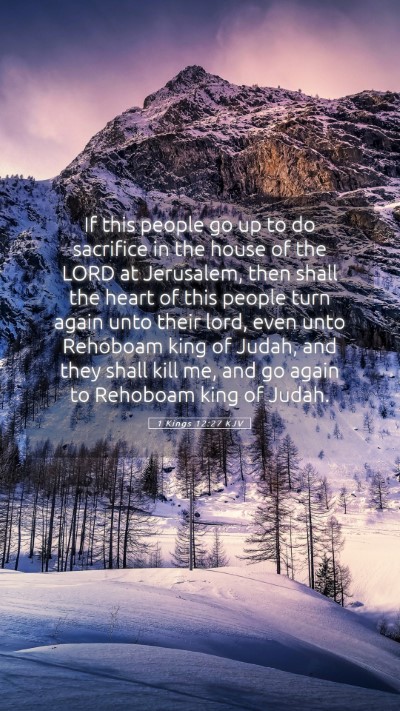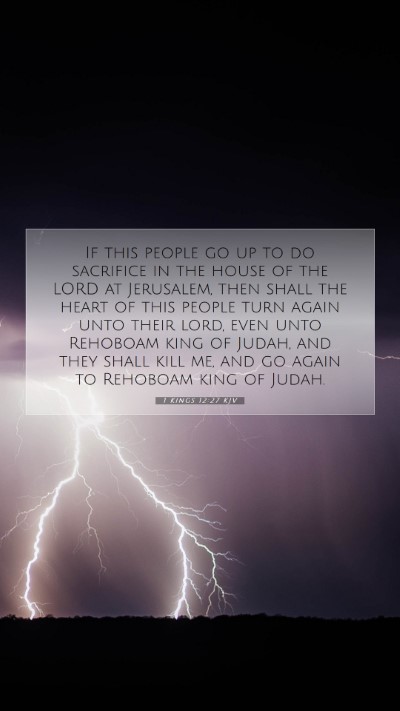Understanding 1 Kings 12:27
Bible Verse: "If this people go up to do sacrifice in the house of the LORD at Jerusalem, then shall the heart of this people turn again unto their lord, even unto Rehoboam king of Judah; and they shall kill me, and go again to Rehoboam king of Judah." (1 Kings 12:27)
Introduction
The verse from 1 Kings 12:27 occurs in a critical juncture in Israel’s history, precisely during the reign of Jeroboam who becomes king of the northern tribes. This verse reflects a deep insight into the political and spiritual implications of worship during this period.
Meaning of the Verse
This scripture unveils the fears and political machinations of Jeroboam, who understands the religious significance of Jerusalem. Jeroboam’s concern is that if the Israelites return to Jerusalem to worship, they may desert him and return to Rehoboam, the king of Judah. This highlights the tensions between the northern and southern kingdoms of Israel.
Commentary Insights
-
Matthew Henry:
Henry elaborates on Jeroboam’s fear of losing his kingdom if the people continue to worship in Jerusalem. He notes that Jeroboam’s pragmatic but misguided solutions led to grave consequences for Israel, including leading the people into idolatry as a means of maintaining his power.
-
Albert Barnes:
Barnes points out that Jeroboam's actions were not just politically motivated but stemmed from a lack of faith in God's providence. He emphasizes the danger of allowing political ambition to dictate spiritual practices, which can lead to a distortion of true worship.
-
Adam Clarke:
Clarke provides context on the historical elements of this passage, discussing the split between the kingdoms and how it affects worship. He indicates that the move from a central place of worship diluted the people's faith and traditions, making it easier for Jeroboam to establish his own system of worship.
Key Themes
- Political Fear: Jeroboam's apprehension reveals the political dynamics at play in Israel post-Solomon. The concern for loyalty juggled political governance and religious fidelity.
- Idolatry and False Worship: Recognizing the temptations to create alternative worship sites as Jeroboam did shows the struggle between true spirituality and the lust for power.
- Memory and Tradition: The risk of forgetting God’s appointed means of worship illustrates how spiritual practices might be compromised by convenience or fear.
Related Cross References
- 1 Kings 11:37-38 - God's promise to Jeroboam.
- 1 Kings 12:28-30 - Jeroboam creates new centers of worship to keep the people from returning to Judah.
- 2 Chronicles 11:14-16 - The Levites abandoning their homes to join Judah and Rehoboam.
Application to Daily Life
In our own lives, striving to manage fear and power dynamics can lead to compromising our faith. This verse serves as a strong reminder to maintain our devotion to God over political or personal ambitions. Engaging in genuine worship, rather than adhering to what is convenient, is fundamental for spiritual integrity.
Conclusion
The analysis of 1 Kings 12:27 demonstrates the interaction between faith and governance, encouraging a deeper understanding of how political decisions can impact spiritual practices. It acknowledges the struggles not only of Jeroboam but of all believers as they navigate their faith amidst worldly pressures.
Further Study Recommendations
For those interested in deepening their understanding of this verse and its implications, Bible study groups and online Bible study resources can provide valuable insights. Utilizing Bible study tools, guides, and lesson plans will enhance your comprehension of scripture analysis and biblical exegesis. Reading through additional commentaries and engaging in discussions about the historical context of Bible verses, such as this one, can offer a broader perspective on scripture interpretation.
Related Bible Study Topics
- How to interpret Bible verses effectively.
- Understanding difficult Bible passages in historical contexts.
- The significance of worship practices in the life of a believer.
- Old Testament prophecy interpretations and their relevance today.


